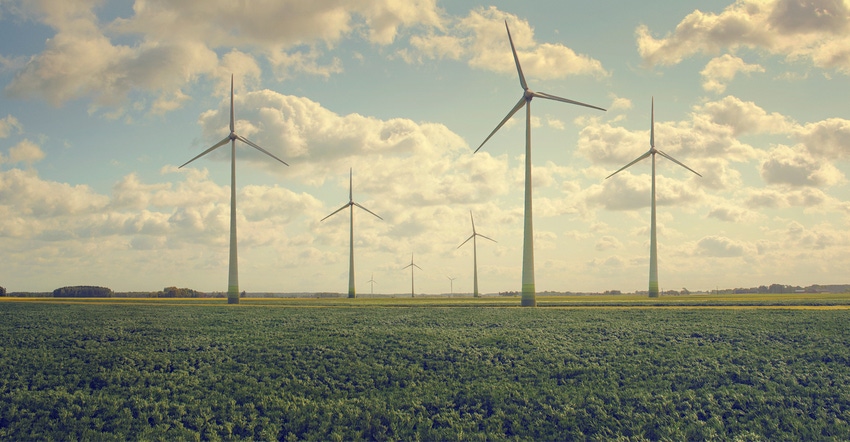
Renewable energy has been good business for Kansas, and the future continues to look bright, according to local leaders and industry experts who participated in a panel discussion, “Renewable Energy and the Local Economy,” in early December.
The panel discussion was hosted by Boost Kansas, an initiative of the American Wind Energy Association, a coalition of civic and business leaders supporting renewable energy projects.
Kansas ranks second among U.S. states for the percentage of its electricity that is generated by wind farms. Wind supports 6,000 jobs in the state and generates $29 million in annual revenue for state and local governments. Royalties on wind projects generate $36 million in revenue annually for landowners, primarily farmers.
The revenue to state and local governments helps fund the building of new facilities and making improvements to roads and bridges, as well as paying for upgrades for emergency services.
Even some companies whose business operations seem unrelated to wind power generation have seen benefits from participating in the industry.
Casey Harbour, Kansas sales manager for Watco Cos., which operates short-line railroads, said the company has benefited from the development of wind.
“Watco has been involved in moving wind components that fit on railcars, and in providing the offloading and storage capacities for storage of components and the logistics of loading trucks headed to construction sites,” Harbour said. “It’s brought us opportunity for the company as a whole — not just the railroads, but in our terminal and ports side; and the logistics side, which provides supply chain services.”
Watco has an off-loading site near the Great Bend airport and another one on Highway 56 between Pawnee Rock and Larned, he said. He said Kansas has 41 wind farms, with more on the docket to be constructed in the next couple of years.
“Companies across the U.S are looking for space to power their operations. Kansas has the potential to be at the top of the list, creating massive investment opportunities for our state,” said Riley Scott, Boost Kansas executive director.
Capital investment in wind energy expanding in Kansas
More than $11.4 billion in capital financing has been invested in the state, providing unparalleled opportunities for workforce expansion and economic growth as a result of wind energy.
“Clean energy is the foundation for our energy future, and states embracing it are winning when major corporations move in or expand their operations,” said Chris Knapp, Apex Clean Energy.
As the country begins to rebuild after this year’s coronavirus pandemic, renewable energy and the manufacturing, infrastructure and technology that go with it will continue to be drivers of the recovery, Knapp said.
Jeff Martin, vice president of customer and community operations, Evergy, added, “Evergy’s installment of Renewables Direct [a program allowing business customers to offset a percentage of their energy use with a renewable resource] to provide competitive pricing for local renewable energy is a great tool to attract new businesses to our area, and to meet the needs of current customers using our area’s abundant wind energy. It helps customers realize their sustainability goals while providing long-term price stability.”
Steve Sloan, CEO of Midwest Minerals in Pittsburg, said, “COVID-19 has emphasized the importance of growing the availability of good, reliable jobs. The wind industry is leading here in Kansas and has created substantial job opportunities for those employed by Midwest Minerals. We are looking forward to the future, as the demand for a renewable energy workforce will only continue to grow.”
Midwest Minerals is in the rock quarry business, providing crushed stone for the construction industry and road maintenance. It also provided materials for Apex Clean Energy’s Neosho Ridge wind farm.
“That project was huge for our company,” Sloan said. “It has 145 turbines, each with its infrastructure and access road. We’ve been in business since 1947 and this was in the top three largest projects we have ever done.”
He said the rock and concrete cost alone for the project was greater than the Neosho County annual budget.
“We don’t typically get projects this size in rural southeast Kansas,” he said. “And the revenue stream doesn’t disappear when the farm is done. They have engineers that maintain the turbines, and those are good-paying jobs. All those roadways have to be maintained, and that means ongoing rock sales for us.”
He said another large Apex project, Jayhawk Wind, is being planned as a 65-turbine project in Bourbon and Crawford counties, and Midwest Minerals is hoping for a share of that business.
“Renewable energy has been a game-changer for us for a year and half while that farm was being built,” he said. “And it provides a long-lasting effect for companies and small towns. We have a lot of infrastructure projects, such as water mains and water treatment plants, that need to be done. These projects are bringing in the money to make some of that work happen.”
About the Author(s)
You May Also Like






